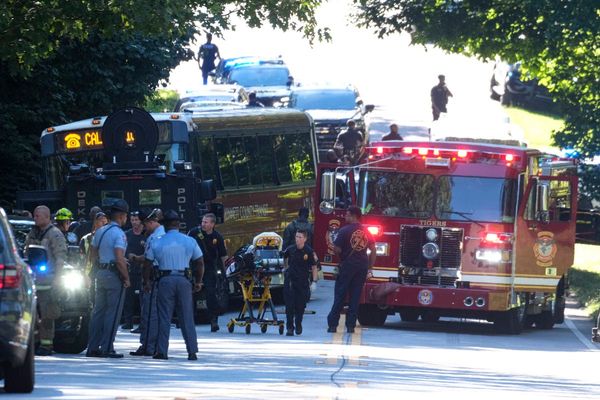
The US supreme court dealt a major blow to LGBTQ+ rights on Friday, by ruling that a Colorado civil rights law which compels businesses and organizations to treat same-sex couples equally is in violation of the right to free speech.
The decision, written by the Donald Trump nominee Neil Gorsuch and reached by a six to three vote of the conservative supermajority, could open the door for businesses to refuse service to some couples based on their sexuality – but could also have the same effect on willingness of service based on a customer’s race or religion, gender or disability.
The case was brought by Lorie Smith, the owner of 303 Creative, a web design company. Smith said she wanted to begin offering wedding websites, but does not want to make wedding websites for gay couples because of her religious beliefs.
Smith has argued that her websites should be classed as art and therefore protected by her constitutional right to free speech under the first amendment.
The state of Colorado said this would violate the Colorado Anti-Discrimination Act, which says businesses cannot refuse services to customers based on sexual orientation, race or disability.
In his majority opinion, Gorsuch said that the first amendment prohibited Colorado from “forcing a website designer to create expressive designs speaking messages with which the designer disagrees”. Backed by the other five rightwing justices who now control the court, he said the constitution protected an individual’s right to free speech “regardless of whether the government considers his speech sensible and well intentioned or deeply misguided”.
The ruling prompted an excoriating dissent from the three liberal justices. Written by Sonia Sotomayor and joined by Elena Kagan and Ketanji Brown Jackson, the dissent noted that the decision was the first time in supreme court history that a business open to the public had been granted a constitutional right to refuse to serve people from a protected group.
“Today is a sad day in American constitutional law and in the lives of LGBT people,” Sotomayor lamented. The symbolic effect, she said, was to “mark gays and lesbians for second-class status. In this way, the decision itself inflicts a kind of stigmatic harm … The opinion of the court is, quite literally, a notice that reads: ‘Some services may be denied to same-sex couples.’”
Sotomayor called the ruling a “license to discriminate” and said it was “profoundly wrong … Our constitution contains no right to refuse service to a disfavored group.”
She went on to warn that the decision would have ramifications far beyond the LGBTQ+ community. “The decision threatens to balkanize the market and to allow the exclusion of other groups from many services” – she gave the hypothetical example of wedding websites being withheld from interracial couples or birth announcements being refused for the child of a disabled couple.
The contentious ruling provoked an immediate storm of heavily polarised responses from politicians and advocacy groups.
Joe Biden issued a statement saying: “In America, no person should face discrimination simply because of who they are or who they love. The supreme court’s disappointing decision … undermines that basic truth, and painfully it comes during Pride month.”
The US president added that he was deeply concerned that the ruling would bring more discrimination “against LGBTQI+ Americans [and] more broadly weakens laws that protect … people of color, people with disabilities, people of faith and women.
He pledged to “work with states across the country to fight back against attempts to roll back civil rights protections”.
The Human Rights Campaign, an LGBTQ+ advocacy group, said the conservative justices had taken a “dangerous step backward” in giving “some businesses the license to discriminate”.
Maura Healey, the first LGBTQ+ governor of Massachusetts, said the ruling illustrated the court’s “callous disregard for the wellbeing of the very communities that need protecting”.
On the other side of the divide, Donald Trump’s former vice-president, Mike Pence, saw opportunity in the ruling for his current bid for the Republican presidential nomination in 2024, in competition with Trump. He bragged that he had “played a role in appointing three of the justices that ensured today’s welcomed decision”.
During the Trump administration, three seats on the court were filled with the ultra-conservatives Neil Gorsuch, Brett Kavanaugh and Amy Coney Barrett.
Friday’s ruling dealt with a question left open in a similar recent case, when the court decided that a Colorado baker did not have to bake a cake for a gay couple’s wedding. The baker cited his religion and also argued that his cakes were art and therefore free expression.
He won because the court said he had not received fair treatment at the hands of the state’s civil rights commission, but it avoided opining on the fundamental principle underlying the cake dispute, the New York Times noted last year – that is, whether businesses that trade with the public are allowed to break anti-discrimination laws because of their owners’ religious beliefs.
One legal expert told Colorado Public Radio last year that Smith’s case should never have made it to the supreme court, because there is “no live dispute”.
“This business does not do wedding services, has never designed a website for a wedding and therefore doesn’t face a live circumstance where a same-sex couple has asked for a wedding website,” said Elizabeth Sepper, a constitutional law professor at the University of Texas at the Austin School of Law who co-authored an amicus brief on behalf of Colorado state for the case.
On the eve of the court releasing its decision, questions were also being asked about the veracity of key evidence in the case. Smith had claimed that she was approached by a gay man named Stewart requesting her services for a wedding website, but the New Republic reported that he had never made the approach and was, besides, in a heterosexual marriage.
Smith was represented by the Alliance Defending Freedom, a rightwing Christian group which has frequently pursued cases targeting LGBTQ+ rights.
The Southern Poverty Law Center classes the ADF as an extremist group.







